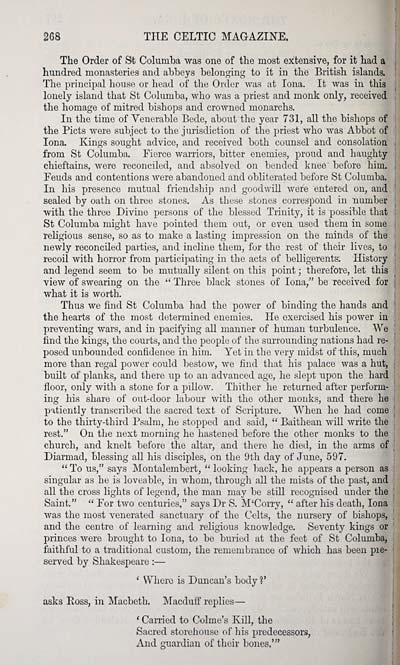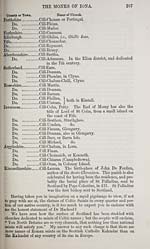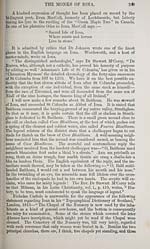Blair Collection > Celtic magazine > Volume 5
(278)
Download files
Complete book:
Individual page:
Thumbnail gallery: Grid view | List view

268 THE CELTIC MAGAZINE.
The Order of St Columba was one of the most extensive, for it had a
hundred monasteries and abbeys belonging to it in the British islands.
The principal house or head of the Order was at lona. It was in this
lonely island that St Columba, who was a priest and monk only, received
the homage of mitred bishops and crowned monarchs.
In the time of Venerable Bede, about the year 731, aU the bishops of
the Picts were subject to the jurisdiction of the priest who was Abbot of
lona. Kings sought advice, and received both counsel and consolation
from St Columba. Fierce warriors, bitter enemies, proud and haughty
chieftains, were reconciled, and absolved on bended knee before him.
Feuds and contentions were abandoned and obKterated before St Columba.
In his presence mutual friendship and goodwill were entered on, and
sealed by oath on three stones. As these stones correspond in number
with the three Divine persons of the blessed Trinity, it is possible that
St Columba might have pointed them out, or even used them in some
religious sense, so as to make a lasting impression on the minds of the
newly reconciled parties, and incline them, for the rest of their lives, to
recoil with horror from participating in the acts of belligerents. History
and legend seem to be mutually silent on this point ; therefore, let this
view of swearing on the " Three black stones of lona," be received for
what it is worth.
Thus we find St Columba had the power of binding the hands and
the hearts of the most determined enemies. He exercised his power in
preventing wars, and in pacifying aU manner of human turbulence. We
find the kings, the courts, and the people of the surrounding nations had re-
posed unbounded confidence in him. Yet in the very midst of this, much
more than regal power could bestow, we find that his palace was a hut,
built of planks, and there up to an advanced age, he slept upon the hard
floor, only with a stone for a pillow. Thither he returned after perform-
ing his share of out-door labour with the other monks, and there he
patiently transcribed the sacred text of Scripture, When he had come
to the thirty-third Psalm, he stopped and said, " Baithean will write the
rest," On the next morning he hastened before the othet- monks to the
church, and knelt before the altar, and there he died, in the arms of
Diarmad, blessing all his disciples, on the 9th day of June, 597,
" To us," says Montalembert, " looking back, he appears a person as
singular as he is loveable, in whom, through all the mists of the past, and
all the cross lights of legend, the man may be still recognised under the
Saint." " For two centuries," says Dr S, M'Corry, " after his death, lona
was the most venerated sanctuary of the Celts, the nursery of bishops,
and the centre of learning and religious knowledge. Seventy kings or
princes were brought to lona, to be buried at the feet of St Columba,
faithful to a traditional custom, the remembrance of which has been pie-
served by Shakespeare : —
* Where is Duncan's body?'
asks Ross, in Macbeth. Macduflf replies —
' Carried to Colme's Kill, the
Sacred storehouse of his predecessors,
And guardian of their bones.'"
The Order of St Columba was one of the most extensive, for it had a
hundred monasteries and abbeys belonging to it in the British islands.
The principal house or head of the Order was at lona. It was in this
lonely island that St Columba, who was a priest and monk only, received
the homage of mitred bishops and crowned monarchs.
In the time of Venerable Bede, about the year 731, aU the bishops of
the Picts were subject to the jurisdiction of the priest who was Abbot of
lona. Kings sought advice, and received both counsel and consolation
from St Columba. Fierce warriors, bitter enemies, proud and haughty
chieftains, were reconciled, and absolved on bended knee before him.
Feuds and contentions were abandoned and obKterated before St Columba.
In his presence mutual friendship and goodwill were entered on, and
sealed by oath on three stones. As these stones correspond in number
with the three Divine persons of the blessed Trinity, it is possible that
St Columba might have pointed them out, or even used them in some
religious sense, so as to make a lasting impression on the minds of the
newly reconciled parties, and incline them, for the rest of their lives, to
recoil with horror from participating in the acts of belligerents. History
and legend seem to be mutually silent on this point ; therefore, let this
view of swearing on the " Three black stones of lona," be received for
what it is worth.
Thus we find St Columba had the power of binding the hands and
the hearts of the most determined enemies. He exercised his power in
preventing wars, and in pacifying aU manner of human turbulence. We
find the kings, the courts, and the people of the surrounding nations had re-
posed unbounded confidence in him. Yet in the very midst of this, much
more than regal power could bestow, we find that his palace was a hut,
built of planks, and there up to an advanced age, he slept upon the hard
floor, only with a stone for a pillow. Thither he returned after perform-
ing his share of out-door labour with the other monks, and there he
patiently transcribed the sacred text of Scripture, When he had come
to the thirty-third Psalm, he stopped and said, " Baithean will write the
rest," On the next morning he hastened before the othet- monks to the
church, and knelt before the altar, and there he died, in the arms of
Diarmad, blessing all his disciples, on the 9th day of June, 597,
" To us," says Montalembert, " looking back, he appears a person as
singular as he is loveable, in whom, through all the mists of the past, and
all the cross lights of legend, the man may be still recognised under the
Saint." " For two centuries," says Dr S, M'Corry, " after his death, lona
was the most venerated sanctuary of the Celts, the nursery of bishops,
and the centre of learning and religious knowledge. Seventy kings or
princes were brought to lona, to be buried at the feet of St Columba,
faithful to a traditional custom, the remembrance of which has been pie-
served by Shakespeare : —
* Where is Duncan's body?'
asks Ross, in Macbeth. Macduflf replies —
' Carried to Colme's Kill, the
Sacred storehouse of his predecessors,
And guardian of their bones.'"
Set display mode to: Large image | Transcription
Images and transcriptions on this page, including medium image downloads, may be used under the Creative Commons Attribution 4.0 International Licence unless otherwise stated. ![]()
| Early Gaelic Book Collections > Blair Collection > Celtic magazine > Volume 5 > (278) |
|---|
| Permanent URL | https://digital.nls.uk/76452110 |
|---|
| Description | Volume V, 1880. |
|---|---|
| Shelfmark | Blair.6 |
| Attribution and copyright: |
|
| Description | A selection of books from a collection of more than 500 titles, mostly on religious and literary topics. Also includes some material dealing with other Celtic languages and societies. Collection created towards the end of the 19th century by Lady Evelyn Stewart Murray. |
|---|
| Description | Selected items from five 'Special and Named Printed Collections'. Includes books in Gaelic and other Celtic languages, works about the Gaels, their languages, literature, culture and history. |
|---|

